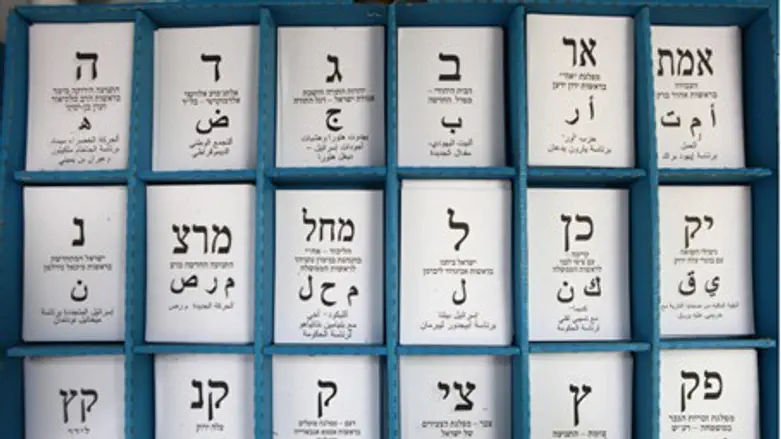
The upcoming Israeli national election for the 20th Knesset will be Israel's 21st national elections. The 20 previous elections include one for each Knesset (two of which were held simultaneously with direct elections for Prime Minister), and one for the post of Prime Minister alone.
In honor of the upcoming elections, the Knesset website has publicized a few thousand short words of factoids, history, numbers and various interesting tidbits and important information on elections in Israel.
Excerpts thereof, with additions and explanations:
When are elections held?
They are scheduled on the Tuesday of the third week of the month of Cheshvan (or the first week, following a leap year) that follows the fourth anniversary of the previous election. However, they are held earlier if the Knesset votes to dissolve itself within three months of the beginning of a fiscal year, or if it was dissolved for any of several other reasons leading to the failure to form a new government.
Age limits and eligibility:
Anyone who is 18 or older on the day of the election may vote. Anyone who is 21 or older on that day may be elected, except for senior public officials such as the Chief Rabbis, judges, the State Comptroller, the IDF Chief of Staff, the Governor of the Bank of Israel.
Also forbidden from running is anyone who was sentenced to prison for more than three months within the previous seven years.
What does the Central Elections Committee oversee?
The various parties and lists of candidates; instructions to the public; electioneering; legal issues and clarifications regarding the elections; the counting of the votes and the distribution of the 120 Knesset mandates; hiring workers to man the polling stations and committees; logistical organization of Election Day.
How are the votes registered?
Every voter places a slip of paper standing for his or her party of choice into an envelope, and then places the envelope into the ballot box. The amount of slips that are printed – for each party – equals the number of registered voters, plus another 30% thereof.
Changing of the Guard
The outgoing Knesset serves until the first day of the next Knesset – which must take place 14 days after the elections, at 4:00 PM.
Electioneering
Election ads are not permitted to be aired on TV or radio between 60 and 14 days before the election. Beginning two weeks before Election Day, each party is accorded a certain amount of minutes of air time, based on its size in the previous Knesset. No ads are permitted from 7 PM of the day before the election.
The Threshold
During the course of the 19th Knesset, the "threshold percentage" – the minimum percentage of total voters that a party must receive in order to be represented in the Knesset – was raised from 2 to 3.25. In Holland, this percentage is 0.67 (two-thirds of one percent); in the Czech Republic – 5%, and in Turkey – 10%.
Non-Kosher Votes
In the election for the 7th Knesset, 4.2% of the votes were invalidated – 60% because of the presence of two identical party slips in the same envelope. As a result, a law was passed to invalidate envelopes only with three similar slips or more, but not two. In the next election, only 1.4% of the votes were invalidated. The current law is that invalid votes include envelopes that are found to have two or more different party slips, or three or more slips of the same party.
Counting the Votes:
The valid votes are counted, and 3.25% of this number is calculated. Votes for parties that received less than this amount are disregarded and not taken into account. The remaining valid votes are then divided by 120, and this number becomes the "quota". For instance, if 1,200,000 votes were found to be both valid and for parties that passed the minimum threshold, the quota is 10,000. Each party is then assigned one Knesset mandate for every 10,000 votes it has received. Fewer than 120 mandates are assigned in this manner – and the remainder is assigned using the Bader-Ofer method.
What is the Bader-Ofer method?
Each party's valid votes are divided by the number of mandates it has received thus far plus one, producing a new "quota." The party with the highest quota receives another Knesset mandate. This calculation is repeated until all the seats are distributed.
History
Four different Knessets had 15 elected parties; no Knesset had more than that. The 8th Knesset had the fewest parties – nine – and the outgoing 19th Knesset had 12 parties.
Eligible voters in the last election numbered 5,656,705. The number of polling stations was 10,132, and the budget for the National Elections Committee was 247 million NIS.
